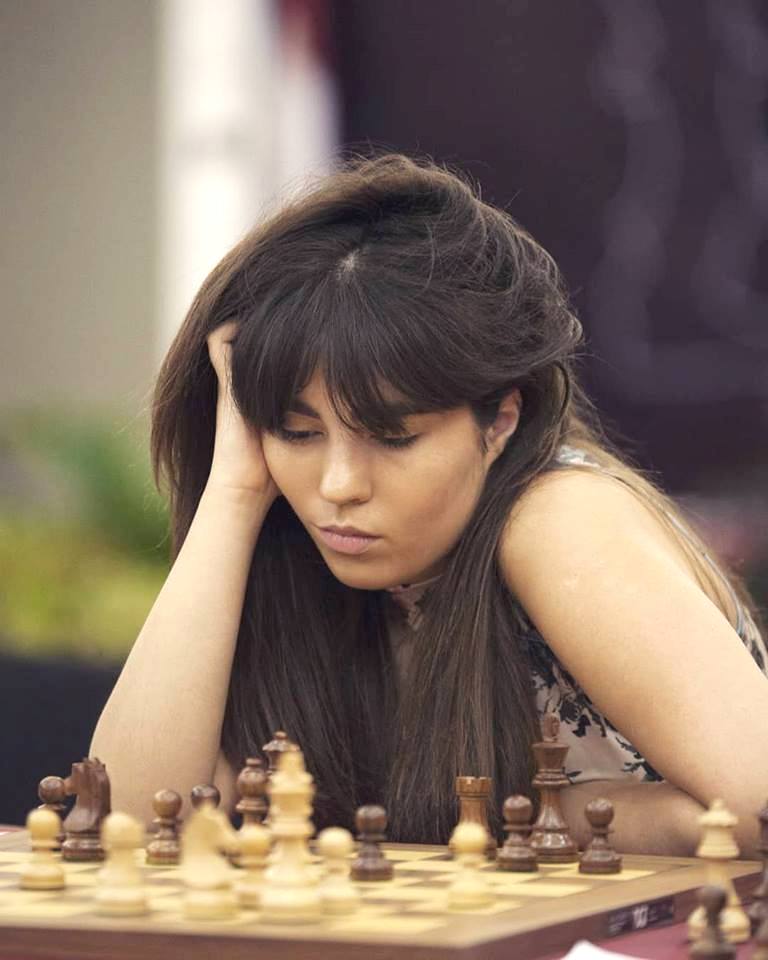Tijana Blagojević is one of the most successful young players in the whole Balkans and one of the most successful female chess players in the history of Montenegro. Her chess biography is impressive – she is the winner of World and European Youth Medals, Woman International Master, owner of one male International Master Norm and three female Grandmaster norms.
She also caused some stir when, in November 2017, she announced she will leave Montenegrin Chess Federation and switch to Serbian. Today she lives and studies in Belgrade.
We took this opportunity to chat about various matters. About her first chess steps, her greatest chess successes, about the reasons for the switch of Federations and challenges female chess players face, about the role of chess in her life today and the relationship between chess and education and about Tijana Blagojević the non-chess-player.
Although we don’t really know each other (if you don’t count online blitz games) she really took the time and effort and answered most of our questions in great detail. My general impression is that Tijana is a very positive, nice, kind and determined person. I think she was also brave to speak openly about problems and challenges she had to face and I take my hat off to her for that.
THE BEGINNING
Q: Hello Tijana! Let’s start with the most cliche and boring question. When did you first learn the rules of chess?
A: I first learned the rules of chess when I was 5 years old.
Q: Your parents are both chess players (Tijana’s father is a Grandmaster, and her mother is a woman Fidemaster). While preparing for this interview, I read you, just like many chess prodigies in the past, learned the rules by observing their blitz and rapid games.
Do you remember how that happened? How come your parents didn’t teach you the rules themselves before?
A: As a little girl, I would see my mother and dad playing chess and I always wondered what were they doing. What were the rules of this game? And what’s the goal? How do you win? I asked my dad if I could play against him, and he beat me. In the next game, I tried to give him a mate in 4 moves, but of course, I did not succeed. 🙂
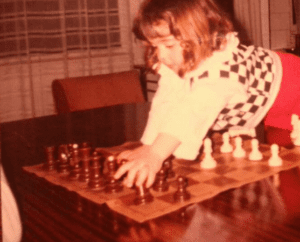
Q: As for these „friendly“ games between your parents – how competitive they were? Was your mother able to hold her ground against a grandmaster? Has your father ever spent a night on the couch because he was winning too much :D?
A: In our family, every “friendly” or “family” game ended up as if we were the biggest opponents. Because, in chess, when you sit at the table, an enemy army is always opposite from you, and not a friendly one. 🙂 My mother was basically losing against my father, but in the event of her winning, there was joy in the house and my mother would radiate with happiness.
Q: I assume your dad (or mom?) was your first chess trainer. How did it look like? Was it more difficult for him to make you work on chess because you were his daughter?
A: Yes, my dad was my first trainer. I remember he started teaching me the endgames. Although I thought it was boring then and I was losing games in the openings, now I am immensely grateful. I think the biggest mistake young players do is starting to learn from the opening. Also, I think it’s an advantage when your parent is a trainer because you have more freedom to work when you are interested or to stop when you say you do not want to play.
They never forced me. When I needed to work, we worked. When I needed to take a break, we took a break. And of course, later I had other great trainers. But none as amazing for me as my parents.
Q: I have often seen parents, especially those who were engaged in a sport themselves, pushing their children and expecting too much from them, which often has a counterproductive effect. In Croatia, some table tennis clubs strictly prohibit parents from entering the playing hall, both during the practice and during the tournaments.
I am often horrified when I see parents „living through their kids“ and putting an enormous burden on their shoulders. Since you won a number of medals and remained in chess to this day, I assume your parents didn’t belong to this group.
What was their secret? How did they balance the line between their wishes and ambitions and your well-being?
A: Fortunately, in our family, we had the freedom to choose what we would like to do. For example, I have 2 brothers (they are twins), and they played chess for 2-3 years, and then realized they did not like it. But, of course, my parents supported them in what they want to do, which was in their case basketball. We always had the possibility of choosing and I have always been grateful for that. They always supported me in with every choice – college, chess, everything.
Q: When did you join a chess club? Did you get your own trainer there, or was the main burden still on your parents?
A: I joined the club at age 9. Although I was too young to be in such a strong club (Telekom) who won the European club championship, Dušanka Jovicevic recognized my talent and helped me during my career, and I am very grateful for her. I came to the club as a girl who did not have any results, and already that year I was 2nd under 10 years old, and the next year 1st.
Q: When did you realize you are gifted for the game? What was your first success?
A: As a child, I thought that I was gifted for playing because I played equally with the older boys from the club. I consider one of my major achievements as a child as getting a norm for the Woman Grand Master title when I was 14.5 years old.
Q: How did you develop a genuine passion for our ancient game – it is not a common hobby choice in general, let alone for a female. Was it because of your parents, because you thoroughly enjoyed it, because you started winning, because of the combination of everything mentioned above, or something else?
A: To be honest, I’ve always loved sports that give equal opportunities for men and women. Where physical strength is not so important, where you can use intelligence to think and to independently make decisions and stand behind your choices and results (not as in team sports, where you can say that someone else is guilty of your success or failure).
CAREER HIGHLIGHTS
Q: In your youth, you showed potential by reaching 2100 in 2012 (before the infamous K40 rule change, mind you – VN). However, then followed a 2-year stagnation period, typical for players close to master level (trust ME dear readers, I know what I am talking about 🙁 – VN).
Would you talk a bit about this period? Was it a matter of a lack of interest in chess, or another case where hard work didn’t bring immediate results?
A: I think this period of stagnation or even fall during 2012-2014 was due to less work. Although, during the summer breaks, I tried to work more at chess. And though the work did not bring immediate results, the following year a lot of progress was made.
Q: Fortunately, at the end of 2014 the stagnation ended in a spectacular manner. In one tournament, you increased your rating by 140 points (from 2105 in December 2014 to 2245 in January 2015).
How did this surge suddenly happen? Was the K40 coefficient already introduced?
Did you change something in your chess training routine prior to that tournament?
A: It was clear that I played better than a 2105 Fide rating, but we just did not know how much I played better. Because I worked a lot (June, July, August) during the summer, this work paid off and I won my second norm for the Woman Grand Master title at the open tournament in Belgrade!
If the opponent in the last round had 10 points higher rating, I would have also gotten an International Master norm!
Q: In a way, this rating leap announced there is a great year ahead of you. And indeed, 2015 was remarkably successful. Most notable were two bronze medals at the European youth championship and World youth championship. Which one was harder to achieve? Which one makes you more proud today?
A: During my first European Youth Championship (2007 under 10 years old) I dreamed of going to the winner’s stand. In the previous years I had the chance to take the medal at the European Championship, (in 2011, in Albena in the last round I lost, if I would win I would be 3rd), but at that moment, although I was won, the desire for victory was so strong that I began to overlook the pawns and at the end mate.
In 2013, I shared a 3-5 place in Budva, but unfortunately, I was 5th. So, I decided last year to give my maximum and try to win a medal at such an important competition and fulfill my childhood dream. It was difficult to win a bronze medal at the World Youth Championship because in the final round I had to beat the world champion under 18 years old with black pieces. Fortunately, I was able to accomplish it!

Q: In the European championship you were close to gold, but you suffered a heartbreaking loss in the penultimate round against Harazinska Ewa, who was rated 300 points below you at a time.
Can you tell us a bit about that game? Did you underestimate her a bit? Were you nervous because you knew you had a genuine shot for the title?
A: It was a hard defeat, which I still remember today. I did not underestimate my opponent, because I knew she was playing much better than her rating. Dad (who was my trainer at that tournament) suggested that I play the best I know (the old repertoire), and that was the first time I did not listen to him. I made one of the typical mistakes that young players make. In such an important game, I tried to play a new variant and “avoid” preparation. But I just did not feel this position and easily lost in the middlegame.
Q: Something similar happened in the World Championship. Two rounds before the finish, you suffered a loss against the underdog Parpieva Nodirabegim from Uzbekistan.
Can you recall your state of the mind at a time? How did you manage to compose yourself and finish the tournament in style – with two wins? Did the situation from the European championship help you cope with it?
A: When the pairs went out, I can say that I was satisfied. Because I was at the top of the crosstable and played with the girl with a 1900 rating, but when we started preparing for her, my dad said that she plays much better than her rating and that I need to be careful and not underestimate her. I tried to give my maximum in that game, but sometimes things are not under your control, and I made a blunder and lost that game.
Q: Apart from good results in youth competitions, you were also breaking through in the „adult chess world“. If I am not mistaken, this is the period during which you became a woman international master. In which tournament did you accomplish did? What did this title mean to you?
A: I won norms for the Woman International Master title in Premier Montenegro League (2012), Karpos Open (2014), Grand Europe Cup Albena (2014) and Grand Europe Cup Golden Sands (2014), but I had to wait to have 2200 (almost 1 year!), to achieve this title.
Q: You also have three norms for woman grandmaster and one norm for the male international master.
At which tournaments did you achieve them?
A: I won these norms in Premier Montenegro League (2012), Open tournament in Belgrade (2014), and Open tournament in Petrovac (2015) where I also achieved the norm for IM.
Q: Which one of these tournaments is most memorable for you?
A: Probably the Open in Petrovac, where I beat 2 GMs, and had 1 draw.
Q: In one interview you stated you play even better when your father is participating in the same tournament, as he both inspires you and helps you with the preparation.
Did he help you with the preparation in other events as well, especially in these European and World youth championships?
A: Yes. it is true. He was my coach at both European and World Youth Chess championships. Also, at the open tournament in Petrovac he did not play, but went to help me to prepare for the games, and I think that I made the biggest success in this tournament.
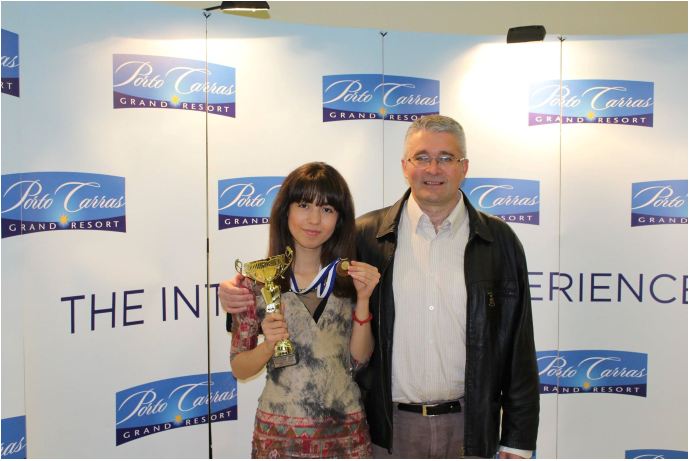
Q: I have noticed you have played a lot in 2015, but I would also assume you were able to focus on chess more before college and before all the drama with the national federation start to unfold. With hindsight, would you agree with the assessment that you played your best chess ever during that period?
A: I was in high school, and I had more time for chess. I traveled more and played a lot of tournaments during the year. Two years ago I enrolled in college and I play less ever since. During 2015, I achieved some of my chess goals, and then I dedicated myself to my studies.
CHESS IN MONTENEGRO AND CHANGE OF FEDERATIONS
Q: Now that I have mentioned drama with the national federation – I would like to talk a bit about your relationship with it – a relationship which ultimately led to you switching federations.
For starters, how would you rate the state of chess in Montenegro in general? Are there enough tournaments, do young players get support and what’s the situation of female chess?
A: Unfortunately, the situation in the Montenegrin chess is catastrophic. The Montenegro chess federation is headed by the president of the Chess Federation, the Montenegrin delegate in FIDE and the secretary. They take what belongs to young chess players. Children themselves finance their departure and travel to European and World Youth Championships. Is not that a shame? All the money belonging to those children, and they don’t spend it on children. There are no open tournaments at all. The only tournaments that are played are national championships and leagues.
There is no women’s league (!), which sufficiently speaks of the blatant issues in Montenegrin chess. They do not invest into the youth at all which exemplifies the results from the European Youth Chess Championships and the European Women’s Team last year!
Q: Let’s talk about „The Decision“. In your open letter to the federation in which you publicly declared you are breaking away from the Federation (available here in Montenegrin language – VN), you said you have „listened to empty promises long enough“ and that you „can’t wait for better treatment any longer“.
What kind of treatment, if any, did you have? Did you get any support whatsoever?
A: Before the current structure in the federation arrived, I had some support. But the poor treatment came after winning medals in the European and World tournaments, after the change of the people and the president of the Montenegro chess federation.
They didn’t pay the coach or the tournaments. They boasted to the Ministry about my results and received money which they never paid to me. They just promised me that it would be “better next year”. Of course, as before, this was just an empty promise.
And that’s just one of the reasons why I decided to leave the Montenegrin federation.
Q: Did anything change after you won European and World medals?
In the aforementioned interview, you said officials were exploiting you for their own personal benefit. How?
A: Unfortunately, it has changed and gotten worse. I was only rewarded by the Ministry of Sports of Montenegro. If you’re interested in what I got from the federation after the medal from the European tournament, I can tell you. A Photograph! It was astonishing. A photograph of the hall! And after the World Youth, nothing!
Q: The comments below this interview are quite disturbing, but one of them stated you complained for no reason, that you are ungrateful since you got enough support and had some sort of stipend. Your comment?
A: Stipend? I never had a stipend from the Montenegro Chess Federation. Never! I really don’t read the comments on these posts because they are anonymous, but I can certainly guess who wrote them! Of course, they are from the President of the Montenegro Chess Federation, the secretary and delegate of Montenegro in the FIDE, and the people who lead that federation.
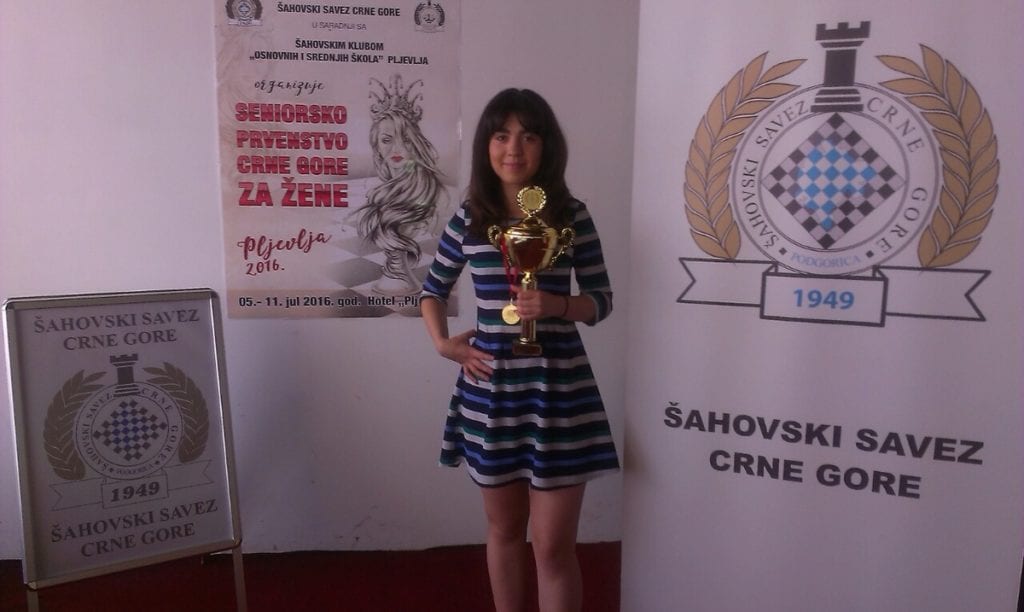
Q: When did you first start thinking about switching to Serbian Chess Federation?
A: When they set up a selector, who is morally unlike for that position.
Q: Yes, you mentioned in your letter that the final nail in the coffin was the selection of International Master Predrag Nikac as a trainer of the Montenegrian female chess team for the European Team Championship 2017. In your letter, you have written that you „ […] think Nikac is not a suitable choice PRECISELY for the female chess team“ and that you „ can’t place the participation in a chess event above your DIGNITY“ (my capitals – VN).
Can you explain on what exactly did you refer there? In which way was your dignity disrupted? What was problematic about Nikac’s behaviour?
A: I am terrified of his dishonesty and all he says, writes or does. I can not quote it. If you are really interested in this, you can check his facebook profile, where you can read some of the nastiness.
Do you think that he can be the selector of the WOMEN’s team and hold meetings?
Q: How difficult was it to decide on it, especially for someone still relatively young? Were you afraid of the effects this radical step might have on your future?
A: That was the only solution. It’s very easy because there is no other choice. When you have nothing in your federation, it is easy to decide to leave and go somewhere where they will respect you more.
Q: How did your parents react? What was their opinion? Were they afraid people from the federation might cause them some problems; especially for your father who is one of the country’s top grandmasters?
A: They support me in everything. Whatever decision I make in life, they will stand behind me. Whatever happens, they stand behind my back and guard me.
GOALS AND FUTURE PLANS
Q: Okay, but thankfully, these problems are now behind you. For the last couple of months, you have been a member of the Serbian Chess Federation. How different is the chess scene in Serbia compared to Montenegro?
A: Yes, it’s behind me, and I do not want to think about them anymore. They’re insane. The competition in Serbia is considerably stronger. The girls are incredibly strong and this is great competition. And they accepted me very well. There are no jealousies like those who were in Montenegro, and it makes us stronger. We fight hard at the board, we work more at chess, we play tournaments and we make progress.
Q: At the beginning of the year, you entered the Information System and Technology Study at the University of Belgrade.
How do you manage to combine your stacked chess schedule with demanding university obligations?
A: I enrolled in college in 2016. In the first year of college, I played less, in order to concentrate and focus on the school work. This year, I played more tournaments, but I did not work on chess enough. But I am using this summer to the maximum. I finished the 2nd year of the faculty, and this year I will be 3rd! When you organize yourself well, you will have time for faculty and chess, and friendships, fun, traveling and so on.
Q: What about your chess future? Do you have any short term or long term goals?
A: A short-term plan is for me to become a woman’s grandmaster because I need only one norm. And I did not think about the long-term. I’m working on my chess and I play how much my time allows me, so we will see.
Q: Have your goals changed compared to, say, three years ago? Have you ever thought you might become a chess professional in the past?
Since you entered a respectable college, I am going to assume the education has prevailed and became a priority.
Have I just blundered there?
A: I love chess, and I enjoy it. But I think that professional chess in this region is not a good choice for women. So, I decided to dedicate myself to education, but surely I’ll play chess as much as I can.
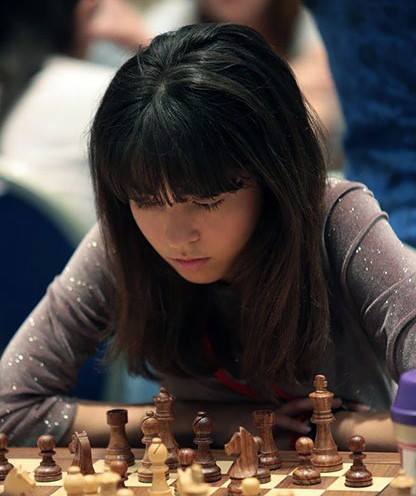
Q: Do you have an ultimate chess dream? What is it?
A: When I was a kid, I had a dream to get a medal from the World Youth, which I have achieved, but now my dreams are not related to chess. But definitely, I think that it is the dream of every player to become World Chess Champion.
Q: If someone offered you to make a living out of chess, would you accept it?
A: I can hardly imagine myself being a professional chess player, but it’s even more difficult for me not to play chess at all. Though chess is a part of my life, it’s not a priority, and I want it to stay that way.
Q: Have you ever considered alternatives to playing chess in the chess world? Female players such as Anna Rudolf, Alexandra Botez and Sopiko Giri have attracted a large number of followers by broadcasting, streaming and creating chess content. Does something like that, or say, chess coaching interest you at all?
A: Yes, this is an interesting alternative. At this moment, since I’m in college and education, I do not have much time to do that, but maybe in the future.
WOMEN AND CHESS
Q: Okay, now that I have mentioned female chess players, I would like to talk a bit about women chess and women in chess a bit, since I think it is an incredibly important topic. A topic that is often sidelined.
As a chess player and engineer, I often see ‘testosterone displays’ in these two fields. What is it like to be a female in a dominantly male environment?
How often do you feel uncomfortable? How often do you face sexism, misogyny and bigotry? How do you deal with it?
A: I grew up in a family with two brothers. My parents never considered gender as a difference between us. And I’ve never felt less valuable than some men, and I think every woman should feel equally valuable. Unfortunately, some people make gender a difference. So, women and men do not have the same conditions. I think the world is changing, and women are slowly occupying their position of equality. I hope things will be completely equalized in the future.
Q: What about creepy online messages? Do you get a lot of these? Did you ever get harassed online?
A: I do not allow people to write such messages. I would just block it. Luckily, I do not have any such inconveniences, and I hope that it will remain that way. I usually talk to friends, dear and nice people, who support and love me. And I’m very happy about that.
Q: Unfortunately, it is not only about Internet trolls. Anyone who has ever googled ‘Kevin Spragget images’ knows what I am talking about. Besides, Garry Kasparov himself has once remarked: „there is real chess and women chess“ (he did later apologize for that). And the current candidate for the FIDE presidency and former World Championship challenger Nigel Short said women are not suited for chess since it requires logical thinking.
How often do you hear the eternal „ women can’t play chess“ argument? Does it bother you? Does it make you angry?
A: Everyone is entitled to his or her own opinion. Of course, several times I heard ‘women’s chess’ from some people, but I was generally more successful than them. I overlook the comments of irrelevant people. It matters to me what my family and my friends think. I’m not interested in the discussion about ‘women chess’ or ‘men chess’. Everyone can have their own opinion.
Q: Although I completely disagree with such an attitude, I can sort of see where it is coming from – currently there is only one woman in the world top 100 and only one woman in history entered the world top 10. Nigel Short tried to defend his statements by claiming woman have a different (not inferior) skillset.
In principle, I agree that men and women are different (that is not to say they SHOULDN’T BE equal. Just that they are biologically different. Seriously, why do people make it so difficult? – VN). On average, spatial, logical and mathematical intelligence is better developed in men, while women excel in emotional and verbal intelligence.
However, the key word here is ON AVERAGE. I don’t think this argument is relevant in chess, simply because the sample is too small. The number of women players is too small.
The inequality of outcome is caused by an inequality of opportunities.
If an equal number of female chess players existed for an extended period of time (say 50 years) and men still dominated, then perhaps drawing some conclusions would be justified. But as long as cultural and other factors are present, the NUMBER OF WOMEN in chess is the root of the problem, not their intelligence.
Sorry for that digression, but I think it was kind of important. What is your opinion on the whole matter? How would you solve the problem with numbers? How would you motivate women to take up chess as a hobby or profession?
How would you change the situation?
A: I think that generally, women are less interested in chess than men. They do not spend as much time working on chess, or maybe it is believed they do not have enough strength to handle the hard training. This may be true in many sports. Less power. But, in chess, this is the least pronounced.
It’s hard to change something for one, two or even 10 years, it’s a process. But it should definitely start from the fact that women play more with men, that the conditions and awards are multipurpose.
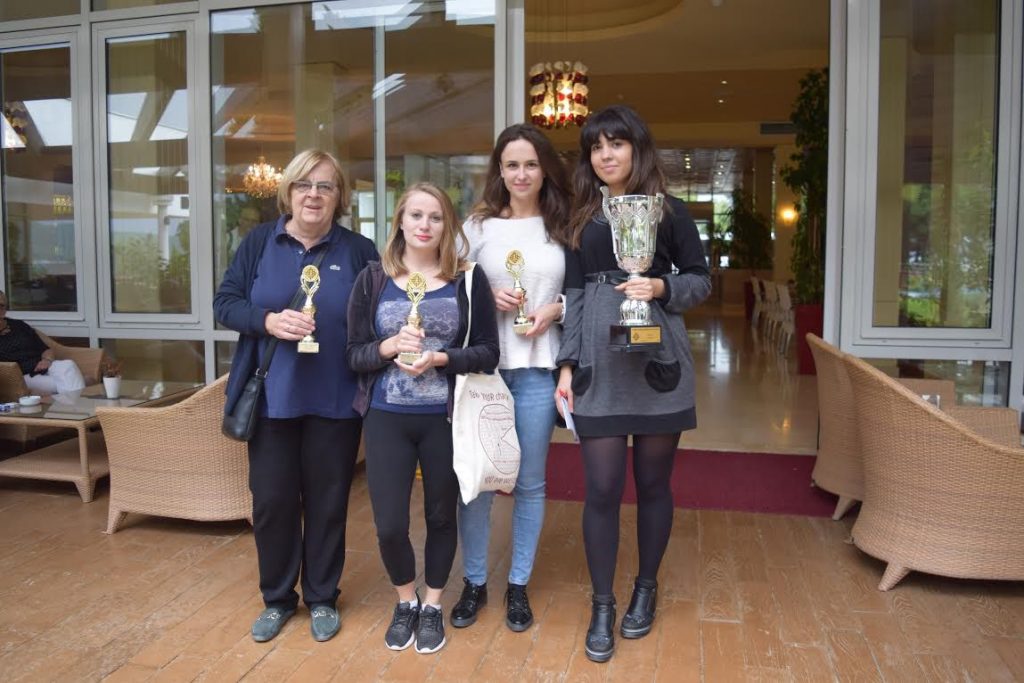
Q: Would you say there is a difference in approach to chess and playing style between men and women? What is it?
A: It is interesting to note that women are more warlike. You will rarely see draws made before 10, 11, 12 moves.
Q: How about coping with losses? Do you think men and women react differently? How do you personally feel after a tough loss?
What do you do to deal with the pain?
A: It depends on the defeat. Not all defeats are the same. If you better, and lose, it hurts more than when someone has outplayed you. I’m a positive person, and after 10, 15 minutes I forget about defeat. I think I’ll learn something from it. It’s a sport. You need to learn how to fight against the rise. It’s an integral part of the game.
OFF THE BOARD
Q: Phew… we are done with difficult and controversial questions. In the last part of the interview, we would like to know who Tijana Blagojevic is away from the chessboard. How would you describe yourself in one sentence?
A: Tijana Blagojević is an ordinary girl with an unordinary hobby surrounded with wonderful people.
Q: Chess players are often considered as fachidiots (or Schachidiots – heh heh – VN). Which hobbies and interest do you have outside chess? What are your interests? How do you like to spend your free time?
A: I spend my free time with friends, traveling, with the people I love. I like to visit different cities and places. That’s interesting to me.
Q: Do you like to read? Which book can be found on your bed table as we speak?
A: When I was in high school I had more time to read, but now only college books can be found on my desk.
Q: The life of a chess player is pretty boemic and involves a lot of travelling. Do you ever get tired of it?
Do you sometimes wish you were just a normal girl with a normal life?
A: I think I will never be tired of traveling. It’s part of my life and the beautiful side of chess.

Q: What about partying, drinking and going out? Do you have time for that? Do you do it as much as you would like?
A: Yes, of course, like many girls my age. But I’m moderate in that.
Q: You have lived in Montenegro, moved to Belgrade. And, as we have said, a life of a chess player is pretty boemic.
Was it difficult to maintain your friendships? In the previous interviews, Leon Livaic and Sven Tica said most of their friends are chess players themselves. What about you?
A: I’m in constant contact with the best friends from Montenegro. When I come to my hometown, we try to use every moment and to be together. My best friend travels to Belgrade when she is free. And I’ve met great friends at the college. My best friends are mostly out of chess. But, of course, I have great friends from chess, and I also hang out with them at tournaments and in Belgrade and outside of the tournaments. They are great chess players and positive people.
Q: What about relationships? Do you have time and resources for one?
A: There’s always time for it. But now I do not have a boyfriend.
Q: Which character traits do you value in people? Which ones are important to you?
A: Caring…
Commitment…
Compassion…
Q: Do you have a life motto? A quote you like? Which one is it?
A: “Life isn’t about finding yourself. Life is about creating yourself.”
“Invest in yourself. “
“Time you enjoy wasting was not wasted.”
Q: What is your biggest fear?
A: I’m not afraid of anyone and anything as long as I do what I think is right.
Q: In the end, which message would you send to young girls contemplating to join a chess club?
A: Do what you love – whether it is chess, another sport, art, or anything else. And always give your best. Nothing in this world can stop you!
Q: Okay Tijana, I’d like to thank you so much for the time and effort you put to answer all these questions.
We hope you will be able to achieve your goals and dreams. We wish you all the best in the future! Good luck!

